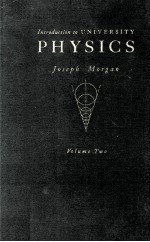图书介绍
Introduction to University Physics Volume TwoPDF|Epub|txt|kindle电子书版本网盘下载

- 著
- 出版社: Inc.
- ISBN:
- 出版时间:1964
- 标注页数:976页
- 文件大小:173MB
- 文件页数:475页
- 主题词:
PDF下载
下载说明
Introduction to University Physics Volume TwoPDF格式电子书版下载
下载的文件为RAR压缩包。需要使用解压软件进行解压得到PDF格式图书。建议使用BT下载工具Free Download Manager进行下载,简称FDM(免费,没有广告,支持多平台)。本站资源全部打包为BT种子。所以需要使用专业的BT下载软件进行下载。如BitComet qBittorrent uTorrent等BT下载工具。迅雷目前由于本站不是热门资源。不推荐使用!后期资源热门了。安装了迅雷也可以迅雷进行下载!
(文件页数 要大于 标注页数,上中下等多册电子书除外)
注意:本站所有压缩包均有解压码: 点击下载压缩包解压工具
图书目录
Part Two ELECTRICITY AND MAGNETISM,GEOMETRICAL AND PHYSICAL OPTICS515
25 Electrostatics517
25.1 Electrification and Electric Charges517
25.2 Electrical Nature and Structure of Matter518
25.3 Charging by Induction521
25.4 Faraday's Ice Pail Experiment522
25.5 Coulomb's Law of Force Between Electric Charges524
25.6 Systems of Units524
25.7 The Rationalized MKS System of Units525
25.8 The Electric Field527
25.9 Lines of Force529
25.10 Gauss's Law530
25.11 Applications of Gauss's Law532
25.12 Electric Potential535
25.13 Equipotential Surfaces537
25.14 Caacitors and Capacitance540
25.15 The Parallel-Plate Capacitor541
25.16 Capacitor Combinations544
25.17 Energy of a Charged Capacitor545
Problems553
26 Current Electricity559
26.1 The Electric Current559
26.2 Resistance and Ohm's Law560
26.3 Current Density,Resistivity,and Conductivity561
26.4 Dependence of Resistivity on Temperature563
26.5 Potential Difference and Electromotive Force564
26.6 Energy,Power,and Joule's Law567
26.7 Combinations of Resistors568
26.8 Circuits with More Than One Source of EMF570
26.9 Kirchhoff's Laws for Electric Networks571
26.10 Electric Measuring Instruments574
Problems580
27 Faraday's Laws of Electrolysis and Thermoelectricity587
27.1 Faraday's Laws of Electrolysis587
27.2 Thermoelectricity591
27.3 The Thermocouple593
27.4 Further Discussion of Conduction in Solids599
Problems605
28 Electromagnetism and Electromagnetic Induction609
28.1 Magnetic Fields and Flux Density609
28.2 Examples of Magnetic Force Actions613
28.3 Ampère's Law620
28.4 Applications of Ampère's Law623
28.5 Magnetic Force Between Two Parallel Current-Carrying Conductors:The Ampere630
28.6 Induced EMF's631
28.7 FAraday's Law of Electromagnetic Induction634
28.8 Lenz's Law636
28.9 Induced EMF in a Rotating Coil636
28.10 Inductance640
28.11 Energy Stored in an Inductor642
Problems646
29 Magnetic Properties,Magnets,and the Magnetic Circuit653
29.1 Magnetic Field Intensity653
29.2 Paramagnetic,Diamagnetic,and Ferromagnetic Substances655
29.3 The B-H Curve658
29.4 The Magnetic Circuit660
29.5 The Concept of Magnetic Poles662
Problems667
30 Alternating Currents671
30.1 Rotating-Vector Representation of an Alternating Current671
30.2 Effective Values of Current and Voltage672
30.3 Circuit with Pure Resistance673
30.4 Circuit with Pure Inductance674
30.5 Circuit with Pure Capacitance677
30.6 Circuit with Resistance,Inductance,and Capacitance in Series679
30.7 Resonance in an R-L-C Series Circuit683
30.8 The A-C Parallel Circuit685
30.9 The Transformer686
30.10 Alternating-Current Meters689
Problems694
31 Electronic Principles697
31.1 Discharge and Charge of a Capacitor Through a Resistor697
31.2 Decay and Growth in a Circuit Containing Inductance and Resistance701
31.3 Differentiating and Integrating Circuits702
31.4 Electron Emission705
31.5 Thermionic Emission706
31.6 The Diode and Rectification710
31.7 The Triode and Amplification713
31.8 The Cathode Ray Oscilloscope716
31.9 The Photoelectric Effect718
31.10 The X-Ray Tube720
31.11 The Geiger and Scintillation Counters722
31.12 The Semiconductor Diode Rectifier726
31.13 The Transistor as an Amplifier730
31.14 Electric Oscillations and Electromagnetic Waves733
Problems737
32 Reflection and Refraction741
32.1 Reflection of Light742
32.2 Refraction of Light744
32.3 Total Internal Reflection747
32.4 The Refracting Prism749
32.5 The Spherical Refracting Surface752
32.6 The Plane Refracting Surface756
32.7 Magnification Produced by a Spherical Refracting Surface757
32.8 The Spherical Mirror758
32.9 Graphical Method for Mirrors762
32.10 Summary of Signs for Use in Refraction and Mirror Equations764
Problems773
33 The Spherical Lens,Aberrations,and Optical Instruments783
33.1 Converging and Diverging Lenses783
33.2 The Thin-Lens Equations785
33.3 Graphical Method for Thin Lenses789
33.4 Lens Aberrations791
33.5 Optical Instruments800
33.6 Photometric Concepts808
Problems815
34 Interference and Diffraction821
34.1 Interference from a Double Slit821
34.2 Phase Change on Reflection825
34.3 Interference from a Film827
34.4 Newton's Rings830
34.5 The Michelson Interferometer833
34.6 Diffraction of Light839
34.7 Fresnel Diffraction840
34.8 Fraunhofer Diffraction849
34.9 X-Ray Diffraction860
Problems866
35 Polarization871
35.1 The Meaning of Polarization871
35.2 Polarization by Reflection and Refraction873
35.3 Polarization by Double Refraction876
35.4 Huygens' Wavelets for Double Refraction878
35.5 The Nicol Prism879
35.6 Polarization by Absorption880
35.7 Polarization by Scattering881
35.8 Elliptically and Circularly Polarized Light882
35.9 Other Polarization Effects886
Problems888
Part Three ATOMIC AND NUCLEAR PHYSICS891
36 Spectra and Quantum Theory893
36.1 Optical Spectra and Spectral Series893
36.2 Quantum Concepts and Bohr's Theory of the Hydrogen Atom896
36.3 Waves and Particles903
36.4 The Method of Wave and Quantum Mechanics907
36.5 The Uncertainty Principle911
36.6 The Principle of Complementarity915
Problems917
37 Nuclear Phenomena921
37.1 Radioactivity921
37.2 The Law of Radioactive Disintegration,and the Radioactive Series925
37.3 Absorption of Gamma-Rays or X-rays929
37.4 The Nuclear-Reaction Equation933
37.5 Induced Radioactivity937
37.6 Binding Energies of Nuclei941
37.7 The Force Between Nucleons944
Problems948
Appendix951
Answers to Odd-Numbered Problems961
Index967